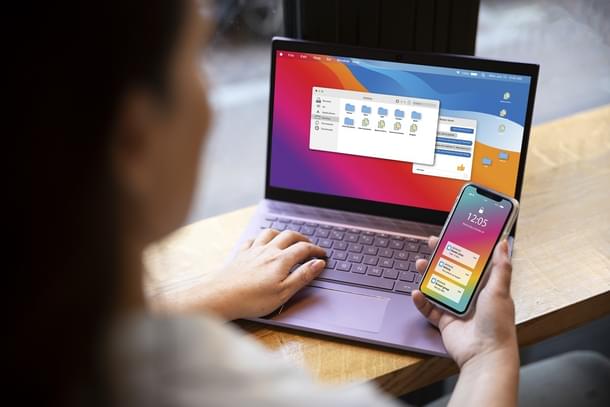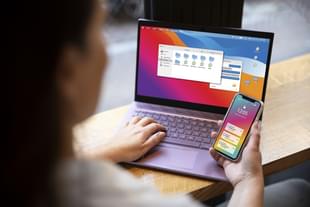Business
Will Restrictions On Import Of Laptops Help Indian Domestic Manufacturers?
Business Briefs
Aug 04, 2023, 12:20 PM | Updated 11:13 PM IST
Save & read from anywhere!
Bookmark stories for easy access on any device or the Swarajya app.


On Thursday (3 August), the Indian government restricted imports of laptops, tablets, personal computers and some other electronic devices with immediate effect.
The step has been taken to encourage manufacturing and assembly of these goods in India.
The government has been focused on building India’s manufacturing capabilities for a while and has introduced several measures like Production Linked Incentive Scheme, Modified Electronic Manufacturing Clusters Scheme, Scheme for Promotion of Manufacturing of Electronic Components and Semiconductors, and several other central and state policies.
The import restrictio is a continuation of the same strategy. The shares of Indian players in the electronics space shot up in trading hours, indicating investor optimism about the move.
Last year, India imported more than $10 billion worth of goods like laptops, personal computers and other devices.
Of this, nearly $6.3 billion was from China and Hong Kong, while Singapore came in at second-highest with $1.7 billion in exports to India. Most of India’s electronics demand is met through these imported goods, while Indian manufacturers have a limited presence in the sector.
The restriction is expected to spur assembly operations in India over the short terms, while helping the value chain to develop in India over the longer term.
Nevertheless, the government has made some exceptions on imports of laptops, including making special licences available. However, even with a licence, importing is expected to be cumbersome.
India Has Restricted Electronics Imports In The Past
Import bans on electronic items are not unusual. In the last three years, the government has already put bans on completely built units of air conditioners and televisions.
These bans are aimed at moving some lower-end parts of the value chain to India.
Initially, the government expects companies to import knocked down units (unassembled components) to be imported into India, and then have these parts assembled in India.
This would help create jobs on the assembly side in India. In addition, low-value parts would be cheaper to procure in India compared to import, providing an impetus to ancillary industries.
Over time, India is expected to see higher value addition as production hits a critical mass, and suppliers become more confident of setting up large capacities in the country.
Several critics have spoken against the PLI scheme due to the current focus on simple assembly, rather than on higher value addition.
However, increasing value addition takes time since suppliers would only set up capacity if they receive assurances of scale, volume, and infrastructure availability.
Past Import Restrictions Have Not Hit Consumer Appetite
Undoubtedly, the suddenness of the current ban would result in a supply chain mismatch, and prices of electronics items would rise in the short term.
Within the next two months, India would witness growing demand due to the festive season, while supply chains would have to rearrange themselves.
As highlighted earlier, the government has instituted bans on various electric products over the last three years.
Each time a ban was instituted there were discussions about the price increases that would follow and hurt consumers.
However, so far, volume growth in the AC and TV market has remained strong. The price increases, including the increase due to inflation, do not appear to have hit consumer appetite.
At the same time, TV and related imports (under the HS code 8527) which had crossed the $2 billion mark in 2019, have now dropped to $1 billion in 2023.
Similarly, AC imports had hit $1.2 billion in 2019, which has come down to $800 million in 2023.
The decreases in imports are despite the growing demand in the markets, implying that domestic players have taken away share from foreign players after these bans were put in place.
Domestic EMS Companies Are Moving To More Complex Products
Indian electronic manufacturing services (EMS) companies have already been moving away from low-end contract manufacturing to offering services such as original design manufacturing (ODM).
Contract manufacturing involves receiving a design and specifications from an original equipment manufacturer (OEM), procuring the components and assembling the appliance.
However, in ODM, the EMS company owns the IP rights for the design, and earns much higher margins for its end-to-end manufacturing.
Similarly, the electronic parts that are being produced in India are seeing an increase in complexity levels.
For instance, on the printed circuit board (PCB) side, India has been dependent on imports for relatively complex PCBs.
However, several major EMS companies have spoken about their intentions to step up capacity in the complex PCB segment as well.
Several of the listed EMS players, who are also the largest in the space, have seen a compounded growth in revenue of more than 35 per cent over the last five years.
Despite a slowdown in the consumer goods market, analysts expect a majority of these companies to deliver revenue growth of more than 40 per cent in FY24, according to S&P Market Intelligence.
The number is bound to increase after analysts recalibrate estimates for the laptop ban. Established players might also be able to enjoy higher margins in this year since setting up large assembly capacity quickly might take some time.
Overall, like TV and AC bans, consumers are unlikely to be hurt significantly by the import ban, while Indian EMS companies take away share from foreign players.





